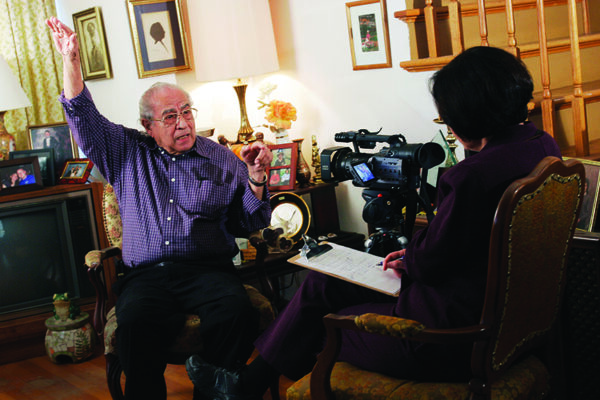Since 1999, the Voces Oral History Center in the Moody College of Communication has been documenting the voices and stories of the Latino community. The project began by recording the stories of World War II veterans and the civilians who witnessed that era before moving on to create more collections centered on the wars in Korea and Vietnam.
Then March 2020 rolled around. The coronavirus started dominating headlines, especially once the World Health Organization declared the virus to be a pandemic on March 11. By the end of the month, Maggie Rivas-Rodriguez, the founder and director of the Voces project, decided this was a topic worth pursuing. They would call the new collection “Voces of a Pandemic.”
For the first time, they were going to document history as it was unfolding.
“Up until now, the interviews that we’ve done, it’s been people talking about the past, what their lives were like,” Rivas-Rodriguez says. “This is the first time that we are looking at how people are living, and I think it’s really incumbent on us to capture that because we want to make sure that when the history is written about the pandemic, Latinos and Latinas are included in that history.”
Rivas-Rodriguez knows that the historical records of past major events do not generally include stories from the Latino community. It’s why she started the Voces project. In 1992, while trying to write a magazine article, Rivas-Rodriguez says she could not find any books on Mexican Americans in the World War II generation. For the project’s first 10 years, she sought to make up for this lack by collecting oral history interviews from across the country.
The Latino experience with COVID-19 is getting more attention. The Los Angeles Times, The New York Times and other news outlets have published articles about how the community is disproportionately affected by the pandemic. There wouldn’t be an issue finding stories for the Voces project, but there would be new training to incorporate 10 universities and one nonprofit group as partners. There was also the transition from previous interviewing practices to using Zoom.
Andrés Torres, a videographer and audiovisual coordinator for Voces, led the training effort to make sure people’s life stories were filmed with appropriate lighting and clear sound.
“Teaching all these academics, journalists or people conducting interviews for us, to show them how to do it was a little bit crazy and difficult,” says Torres, who earned an MFA in filmmaking at The University of Texas. “But it’s also interesting because all these people now are trained to do oral history interviews, which is great.”
With more interviewers across the country comes more interview subjects. As of mid-October, at least 91 interviews had been completed, with many more subjects waiting their turn.
This is the first time that we are looking at how people are living, and I think it’s really incumbent on us to capture that.
Vincent Peña, a doctoral student and graduate research assistant for Voces of the Pandemic, says the interviewers looked for subjects by starting with their friends and families. Peña interviewed his aunt and her partner. When he interviewed his brother, he says he learned much more beyond the rants they usually shared about the coronavirus.
“We talk about this pandemic all the time, but not in such a way that is outlining all the various ways that affects you,” Peña says. “We just vent to each other, and that’s not the same as being asked, ‘Hey, how does the coronavirus impact your day-to-day life?’”
Not all interviews have taken place online. On the Fourth of July, Torres drove to Fort Worth to meet Diego Nevarez, a Mexican American teenager who was an actor in Torres’ films. He was throwing a farewell party before leaving to join the Army, and Torres wanted to document his experience, even if Nevarez was not negatively affected by COVID-19.
“For me, it was important to get that document for Voces, but also, how does it look for a Mexican American first-generation teenage boy who is about to join the Army? How does it look joining the Army in a pandemic?” Torres says.
The project has yet to fully analyze the interviews to address trends within the research. Nonetheless, Peña has noticed patterns. Latinos and Latinas did not seem to understand the gravity of the pandemic, partially due to lack of outreach, he says.
“If you went to H-E-B at the height of it when everyone was hoarding the toilet paper, H-E-B was packed with a line out the door,” Peña says. “If you went across the street on I-35 to the Fiesta, the Fiesta was like a normal day. No one’s masked up.”
Through the interviews, Peña also says he’s seen the collision of two major historical events as subjects discuss how recent protests against police brutality relate to them. Rivas-Rodriguez says there are so many topics to cover within documenting the pandemic, whether it be the political process, Black Lives Matter or the economy.
Interviews need to be uploaded, transcribed and indexed, and several of them are at least an hour long. With Torres using equipment from home instead of on campus, the uploading process takes longer than usual, he says. But he doesn’t mind. It’s worth his time.
“Even though it’s hard, because it’s not just this recording of people talking, it makes me hopeful that if people see us and if we see each other, we can be able to be better, evolve and make changes and in our society as human beings,” Torres says.




